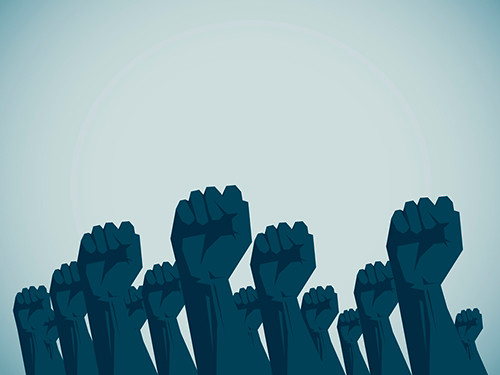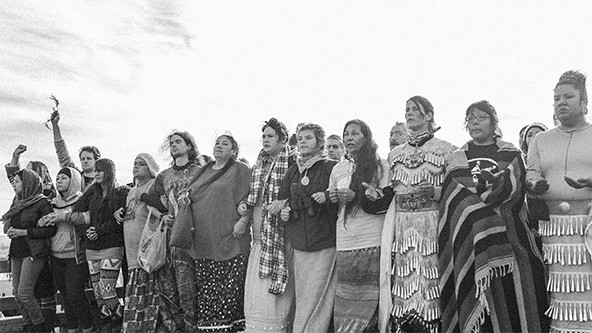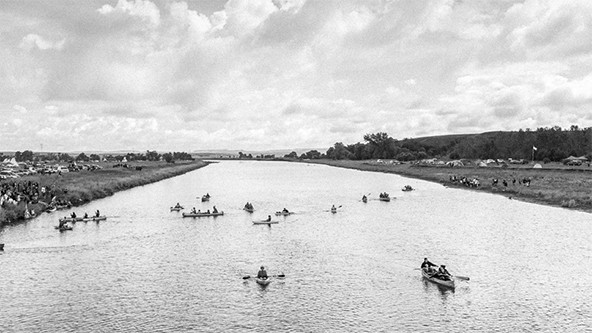 Land Defenders in the Black Hills, July 3, 2020. (Photo by Willi White)
Land Defenders in the Black Hills, July 3, 2020. (Photo by Willi White)
We’ve seen the research. The fraction of philanthropic support that reaches Indian Country and Indigenous-led organizations has remained largely unchanged for decades, while institutional philanthropy has come to rely heavily on non-Indigenous-led organizations or intermediaries to carry out their priorities and strategies. But when priorities and strategies don’t emerge from the community and are implanted from the outside, we can find that philanthropic institutions are advancing their own interests while remaining comfortably distant from (and only loosely accountable to) Indigenous Peoples and communities, forgoing any deeper understanding of or respect for tribal sovereignty. Indeed, many philanthropists consider the matter “too complex,” an inadequate and unserious approach, especially when compared to the multitude of federal and philanthropic regulations that must be navigated by Indigenous Peoples and tribes working to develop their communities.
Over the years, I’ve worked within and across the nonprofit, tribal, and philanthropic arenas. I’ve been a paid staff or consultant for foundations both large and small. I’ve served on countless Native American advisory boards. All of this has been valuable work. It has been important work. Yet the operative word here is “advisory.” These boards are the place and opportunity to advise predominantly Euro-American-led institution(s) on how to best serve Indigenous Peoples. These roles typically fall short of sharing actual decision-making power, or of assuming the role of board member or senior leader.

Most nonprofit development, fund development, and fundraising curricula espouse diversity, equity, and inclusion (DEI) in nonprofit boards, but while donors often use DEI as a lens to assess best practices among nonprofit organizations, that doesn’t mean they turn the same lens on their own institutions and practices. Similarly, conventional nonprofit and fund development training encourages the presence and inclusion of financial expertise and wealth on boards of directors, which often implies the seating of a non-Indigenous ally who then shares decision-making. Non-Indigenous allies then share decision-making power over how Indigenous communities are served, resourced, or impacted.
However, the reverse is not the case in institutional philanthropy, even where Indigenous people with lived experience, practice wisdom, knowledge, relevant expertise, and qualifications can and should share decision-making power over the vast abundance of philanthropic resources. This decision-making and power imbalance is at the core of institutional and structural racism, perpetuating a glaring double-standard.
When most philanthropic leaders ask what systemic racism is, they can look to their own organizational structures and where decision-making authority is centered. When we speak of systems of white supremacy, it is not only the presence and proliferation of domestic terrorist groups such as the Ku Klux Klan and other extremists. Philanthropy and the nonprofit industrial complex are still rooted in Andrew Carnegie’s The Gospel of Wealth, a model of “charitable giving” still premised on wealthy white folks making decisions on what benefits poor people and people of color. But the financial wealth upon which institutional philanthropy is built is drawn from the exploitation and marginalization of the lands, resources, and bodies of Indigenous people and other people of color. Even when the sector strives to “do good” or “make a difference,” the presence of Indigenous people on the staff within institutional philanthropy is rare, and their presence on boards of directors is rarer still.
Despite the contradictions and disparities within this sector, many of us have dedicated years to funder and donor education. Yet real change in the level of philanthropic investment in Indian Country remains elusive. Indian Country and Indigenous-led causes and organizations remain largely under-funded, under-capitalized, under-invested, and under-estimated. To be clear, the very premise of donor and funder education itself is a construct of white supremacy since, as Carnegie believed it should, decision-making lies with wealthy white folks. And the philanthropic sector will continue to uphold that construct unless vigorously challenged, dismantled, and rebuilt.
For this reason, while allies and advisors are important in our work, it’s more important to support and develop our own Indigenous power, leadership, and decision-making. If we don’t do so, the danger is that the organizations and efforts we’ve worked hard to build over time will simply become mirrors or extensions of the very systems we want to change.
When we reference the land and assets that were amassed by philanthropists, we are talking about resources stolen through coercion and unscrupulous policy and practices, as when the General Allotment Act of 1887 (commonly known as the Dawes Act) removed 90 million acres from Indian ownership or control. Continued federal mismanagement of the lands that remained would become the basis of the settlement resulting from the Cobell v. Salazar lawsuit, which was decided in 2009 after 13 years of litigation, made possible by the courage and foresight of Blackfeet heroine Eloise Cobell. But an entire system of wealth was built from Indigenous assets, whose non-Indigenous beneficiaries now make decisions on what is appropriate and necessary for our communities’ prosperity. That is the definition of white privilege and that too needs to change.
The LANDBACK movement is based on our relationship with land and the reclamation of the land itself. A full rematriation/repatriation of wealth is necessary, a full and complete return of that wealth to Indigenous hands, under Indigenous control. Anything short of that is simply a marginal attempt at justice and equity. Justice and equity are still concepts that institutional philanthropy and the nonprofit sector struggle to comprehend and operationalize. Their mission and values statements, land acknowledgments, niceties, and platitudes mask any real substantial behavioral or procedural changes.
Time’s up. We are in transformative, revolutionary times, both socially and environmentally. We’re not asking anymore. We’re not just calling out, we’re calling in. Calling for a fuller understanding and reckoning of Indigenous power and community self-determination.
 (Photo courtesy of NDN Collective)
(Photo courtesy of NDN Collective)
The NDN Collective mission is to build the collective power of Indigenous Peoples, communities, and Nations to exercise our inherent right to self-determination while fostering a world that is built on a foundation of justice and equity for all people and the planet. As changemakers, we are committed to dramatically increasing philanthropic investment into Indigenous-led organizations and modeling a mindset of abundance. We integrate culture and ceremony into our work and acknowledge and pay respects to our elders and past while taking control of our future. We believe in, invest in, and support Indigenous self-determination, genius, and ingenuity, working toward sustainable solutions and the interconnectedness of all things. Our grantmaking supports and advances these values and the following three core principles and strategies:
Defend | We must continue to defend our people, communities, and nations against negative resource extraction that poisons our people, pollutes our water, destroys our land, contributes to climate change, and violates our human rights. Doing this by organizing our communities, making our voice heard, and utilizing a wide variety of tactics is imperative in shifting the political and financial systems that are impacting our communities.
Develop | We must continue to develop Indigenous communities in a regenerative and sustainable manner based on our values and connection to land, culture, and identity. We need to meet the needs of the present generation without compromising the ability of future generations to meet their own needs. We are doing this through regenerative community development, renewable energy investments, and social enterprise development.
Decolonize | We must continue to decolonize our minds, communities, and sovereign nations. The decolonization of our communities and people is directly related to our ability to prosper: Through the revitalization of our Indigenous ceremonies, culture, languages, and life ways, we will continue to strengthen our identity and break free from the oppressive systems that disconnect us from achieving the healing growth and connection to spirit that is integral for us as Indigenous people.
In 2021, NDN Collective will offer Community Self-Determination grant opportunities, intended to strengthen and leverage long-term financial sustainability of Indigenous-led organizations, including capital support and investments. This type of funding will not only give Indigenous organizations the kind of runway that has been long understood as healthy for startups and private-sector companies but will be transformative for community-based and grassroots organizations, including those who are closest to the issues and the impact.
NDN’s grantmaking approach is based on reciprocity and mutual aid, which may include thought partnership and capacity-building resources. Relationship is at the core of this approach, encouraging systemic change in which the people most affected take responsibility for one another. It is up to the community to determine the steps for true self-determination, an approach that encourages innovative, creative, and free-thinking for long-term change. NDN also remains steadfast in its commitment to uphold and advance regenerative and earth-centered principles of community and economic development. Because NDN’s commitment to a new and better normal is also part of community self-determination, resilience, and sustainability, NDN seeks to support tribes, Indigenous Nations, communities, and organizations who are also committed to more innovative, sustainable solutions. NDN is deeply committed to supporting Indigenous sovereignty and self-determination that supports justice and equity for people and the planet. These principles and the principle strategies of Defend, Develop, Decolonize form the lens through which relationships are developed.
Sizable grants and multi-year support will be available to Indigenous-led organizations working in the defense, development, and/or decolonization of Indigenous Peoples and the planet. This includes tribes, First Nations, and Indigenous-led nonprofit organizations across Turtle Island and beyond, spanning North America and the post-colonial borders of the United States, Mexico, and Canada. NDN defines Indigenous-led as organizations or entities whose board or decision-making body composition is 100 percent Indigenous and whose staff composition is at least 70 percent Indigenous. (Initially, organizations with less than that composition may still choose to apply, but it will be expected that plans for developing and empowering 100 percent Indigenous leadership and decision-making are shared.)
Community Focused
It’s important to be mindful of the foreign, colonial lens being applied to community development. We’re extremely careful about academic or philanthropic jargon related to “scale” and “replication.” Community work is complex. It is nuanced. It is homegrown. An effective effort, initiative, or organization in one community may not be effective in another. To truly honor community self-determination, each community’s efforts must be supported in their own context, and in their own unique way. This is not to say that valuable insights and lessons learned cannot be shared. But any application of those insights and lessons learned must occur with thoughtful consideration of specific community conditions, strengths, challenges, and relationships. Most importantly, the community tells us what best aligns and fits with their intentions and priorities.
This is required of us because we are in revolutionary, transformative times. We’ve already been called to radically reimagine the future. And our NDN Collective vision includes all of us:
United like never before, we rise together—arm in arm—to equip all Indigenous Peoples with the tools needed to become architects of our future. Through a holistic approach to infrastructure, funding, advocacy, movement building, and philanthropy, we are fostering a world of justice and equity for all people and the planet.
Mitakuye Owasin. We Are All Related.
 (Photo courtesy of NDN Collective)
(Photo courtesy of NDN Collective)
Support SSIR’s coverage of cross-sector solutions to global challenges.
Help us further the reach of innovative ideas. Donate today.
Read more stories by Gaby Strong.

